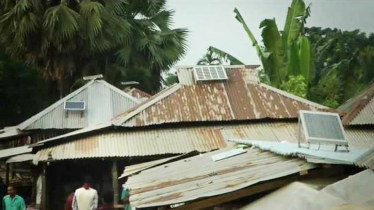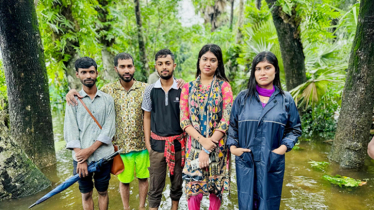
Marium Meem. Photo : Messenger
Bangladesh is going through a severe Heat Wave. The consequent effect of it is ultimately affecting every sector of people. Soaring temperatures and record-breaking heat waves are becoming a terrifying reality. While climate change is a significant culprit, human actions like deforestation and rampant urbanization are exacerbating the issue.
Trees play a vital role in regulating temperatures by providing shade and releasing water vapour through transpiration. However, large-scale tree felling and urban sprawl are leading to a decline in tree cover, creating a vicious cycle.
But the harsh reality is that trees are being cut very alarmingly countrywide and for this reason, there arise some more lengthy consequences to follow soon after. So for a healthy and liveable country, it is very important to plant trees more and more. Otherwise, the entire scenario would be more unbearable for the upcoming years.
Studies have shown that urban areas with sufficient tree cover can be several degrees cooler than those with minimal greenery. A 2020 study published in the journal Nature Sustainability found that planting trees in cities could reduce peak summer temperatures by up to 4°C (7.2°F).
The exact number of trees cut down globally is staggering, with estimates ranging in the billions each year. While reforestation efforts are underway, they need significant acceleration to counteract deforestation rates.
Fortunately, there are alternatives. Urban planning that incorporates green spaces and promotes tree planting is crucial. Preserving existing forests and implementing stricter logging regulations are also essential steps. Individual actions like planting trees in your own community can also contribute to a cooler future.
By recognizing the role of trees in mitigating heat waves, we can take action to protect our existing forests, promote smarter urban planning, and plant trees for a cooler tomorrow.
How to Survive a Heat Wave?
Beating the Heat:
Heat waves, with their scorching temperatures and relentless sun, can pose a significant health threat. However, by taking some precautions, we can stay safe and comfortable even during these periods.
Staying hydrated is paramount. Drink plenty of water throughout the day, even if you don't feel thirsty. Avoid sugary drinks, alcohol, and caffeine, which dehydrate you further. Opt for water, électrolyte-rich beverages, or even fruits and vegetables with high water content.
Limiting outdoor activity is crucial during the hottest part of the day, typically between 10 am and 4 pm. If you must go outside, wear loose-fitting, lightweight clothing made from breathable fabrics like cotton. A wide-brimmed hat and sunglasses further protect you from the sun's harmful rays.
Keeping your home cool is essential. Close windows and curtains during the day to block out sunlight and heat. Utilize air conditioning if available. If not, create a DIY air conditioner by filling a large bowl with ice and positioning a fan in front of it. The cool air will circulate throughout the room.
Checking on vulnerable individuals is vital during heat waves. Infants, young children, older adults, and those with chronic health conditions are more susceptible to heat-related illnesses. Regularly ensure they stay hydrated and cool, and seek medical attention if needed.
By following these steps, we can navigate heat waves safely and ensure our well-being throughout these scorching periods.
Marium Meem
Student and Journalist
Messenger/Hasan/Sumon








